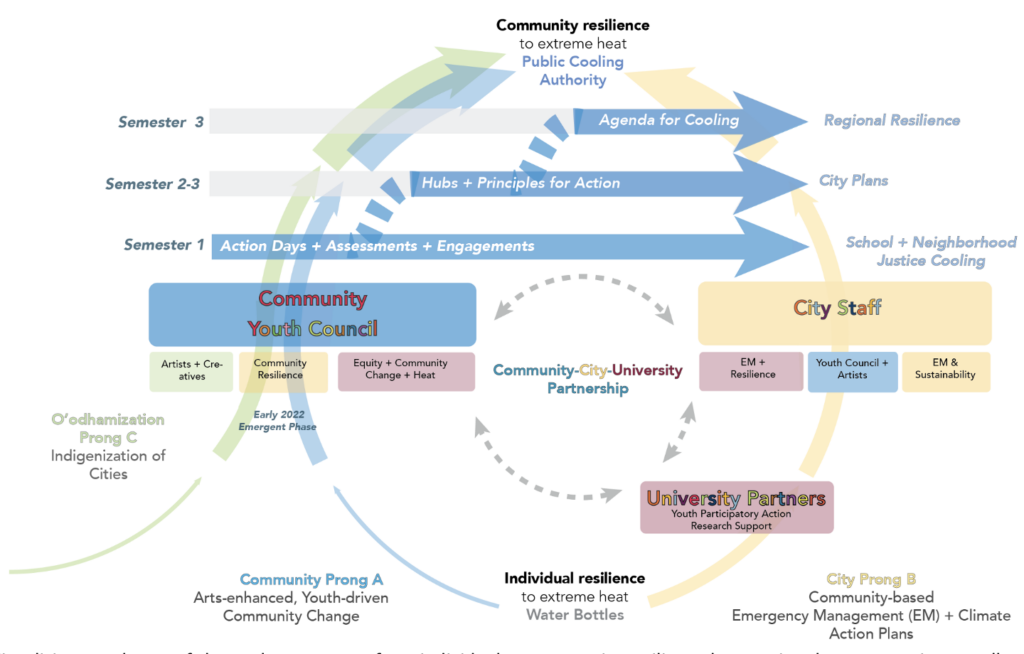Greetings from Tempe, Arizona, which is the homeland of the Original Peoples who have stewarded this landscape since time immemorial. This land continues to be spiritually connected to the O’Odham of the Salt River Pima-Maricopa Indian Community and Gila River Indian Community. We reflect the City of Tempe Land Acknowledgement as we report on a project called Cool Kids, Cool Places, Cool Futures / Neighborhood Justice led by the City as a Community-City-University Partnership, supported with funding from the Robert Wood Johnson Foundation and other sponsors. We acknowledge our white, European ancestry.
The goal of our project was to transform the approach of building resilience to extreme heat from an individual responsibility into a collective responsibility for community resilience to extreme heat. The visual below shows our Theory of Change: to 1) to build community-based, arts-enhanced, and youth-focused ways of knowing, working and placemaking/-keeping (blue and green prongs) to move from individual responsibility to extreme heat to collective responsibility for equitable community resilience region-wide, through city and regional collaborations (yellow prong).

Although our Theory of Change showed that relationships are essential, we first did not attend to relationship building as much as warranted by the aspired change. Struggling to build momentum, we encountered challenges in our collaborations with our partnering high school students and artists. Adjusting our approaches and working together constructively through these conflicts catalyzed our learning for the Partnership.
Co-creating actionable knowledge and implementing it in joint projects hinges on meaningful relationship building. We needed to learn how to build authentic relationships and how to truly relate to each other. This required us to unlearn some conventional and transactional ways of relationship-building and to peel back the layers of colonialism and structural racism in the history of heat in Tempe to understand today’s root causes of heat vulnerability and how to effectively address them. This learning journey set in motion inner transformations allowing us to build new ways of knowing and working with each other that are reflective of project partners.
We can share the following:
Hot Tip:
Transformational change processes like the one aspired by our project needs people that can build the relationships and nurture them beyond the grant-funded project period. Thus, acting on our learning, we turned to leveraging one-time project funds and successfully advocated for creating full-time, permanent positions supporting the Partnership collaboration long-term.
Rad Resource:
Working with tools from innovative academic traditions of evaluations has been very effective for us in transparently accounting for what we have achieved and to what extent. Yet, only in complementing this with an indigenous evaluation approach allowed us to truly recognize the pivotal role and impact of relationships as the 7 Directions of Indigenous Evaluation Framework foregrounds reflections on relationality among people, to Earth and Sky, and to oneself.
Lesson Learned:
Most importantly, through our collaboration with our indigenous artists, we learned that as non-Indigenous project PI/Co-PIs, we can ally as supporters to learn appropriate protocols from our partners. Yet, for a project that aims to engage in processes of decolonization to support indigenization of the City, it was important for us to recognize that we needed to first step back and wait to be invited into building relationships, honoring “invitational space” as Nan Weipeihana coined it.
The American Evaluation Association is hosting Indigenous Peoples in Evaluation (IPE) TIG week. All posts this week are contributed by members of the IPE Topical Interest Group. Do you have questions, concerns, kudos, or content to extend this AEA365 contribution? Please add them in the comments section for this post on the AEA365 webpage so that we may enrich our community of practice. Would you like to submit an AEA365 Tip? Please send a note of interest to AEA365@eval.org. AEA365 is sponsored by the American Evaluation Association and provides a Tip-a-Day by and for evaluators. The views and opinions expressed on the AEA365 blog are solely those of the original authors and other contributors. These views and opinions do not necessarily represent those of the American Evaluation Association, and/or any/all contributors to this site.
